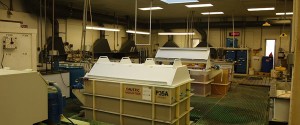Metal Finishing with Invar and Alloy42
What is Invar Alloy?
Invar is a nickel-iron alloy that is known for its low coefficient of thermal expansion. This remarkable discovery is 36% Nickel and 64% Iron. Charles Guillaume developed the compound in 1896 and called it Invar. The name, “Invar”, is short for Invariable, because it is nearly immune to changes in temperature.
Guillaume won the Nobel Prize for this discovery in 1920 because his discovery made it possible to make extremely accurate scientific instruments. For over a hundred years, Invar has been useful for its unique properties. Invar is still used extensively in a wide variety of industrial and scientific applications. We are pleased to be able to offer Invar as one of our many metalworking services.
Notable Properties of Invar Alloy
Also known as Invar36, Invar alloy has a unique combination of properties from pure nickel and pure iron, while also having a variety of new properties unique to the alloy.
Invar Thermal Expansion Capabilities
Invar has a Coefficient of Thermal Expansion of almost zero. This means that Invar36 does not expand nor contract when subjected to extreme temperatures. Very few other metals and metal alloys contain a near 0 CTE. For example, Invar’s CTE is one-tenth of carbon steel, meaning it expands exponentially less at higher temperatures. This makes Invar a highly practical choice for high precision machine parts that may also be subject to extreme thermal conditions.
Cryogenic Stability
Invar’s low Coefficient of Thermal Expansion its ability to withstand temperatures of up to 500°F without expanding, but what may be more impressive is that the metal can also reach cryogenic temperatures (<-130°F) with little to no consequence. This allows for Invar to be a common alloy when working with aerospace and defense technology that may be subject to the freezing temperatures outside our atmosphere.
Invar to Alloy 42
Since its discovery, Invar has been further developed into a related product: Alloy 42. Alloy 42 is like Invar with a slightly different Nickle to Iron ratio. It is 42% Nickel and 58% Iron. Alloy 42 is now increasingly common for its use in metal finishing, electrical components, electrical circuits, aerospace, glass, ceramics, and other uses.
What Are the Differences between Invar and Alloy42?
While the two are similar in chemical makeup, both being Nickel and Iron compounds, the main difference comes from the varying percentages of each element. Invar has a ratio of 36% Nickel to 64% Iron, while Alloy42 has a ratio of 42% Nickel to 58% Iron. The increase in Nickel lowers the conductivity of Alloy42, making Invar the slightly superior conductor.
Alloy42 can withstand higher temperatures than Invar, being able to reach 520-570°F without expanding. However, it does not have the cryogenic capabilities that Invar has, as it can only maintain structure at temperatures higher than room temperature.
Industrial Uses for Invar & Alloy42
Some applications for Invar and Alloy42 include:
- Radio and Electronic Devices
- Automotive and Industrial Lamps
- Semiconductor Frames
- Glass to Metal Seals
- Cryogenic Components
- Laser Systems
- Aircraft Control Components
- And more!
We highlight Invar and Alloy42 on our website because we feel its unique properties in metal finishing are very useful to our clients. We put a tremendous amount of pride into our high quality and certified metal finishing. We have a wide variety of offerings on our website and please do not hesitate to ask if you do not see a particular substrate listed. Let us know how we can help you with your next metal finishing project. Contact us at 888-275-0880 for more information!

